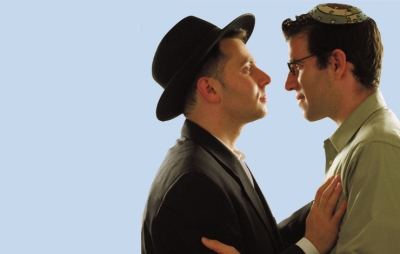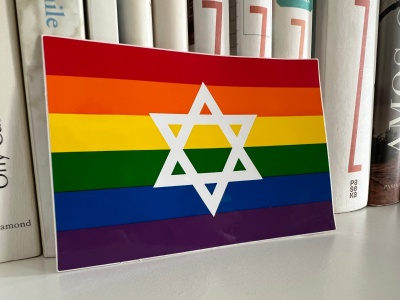
The parshah (Torah portion) for May 4, 2024 is Acharei Mot, Leviticus 16:1-18:30. It explains how to approach the divine and who should approach the divine in the context of establishing a yearly day of atonement to absolve the people of their sins. This atonement day proscribes various rituals for the high priest to perform that day including immersions in ritual baths, special clothing, many animal sacrifices and sprinklings of blood, an incense offering, and a goat let loose in the wilderness carrying the sins of the community. In addition, the parshah warns against idolatry and forbids the drinking and eating of an animal’s blood, as it contains its soul. The parshah ends with a list of prohibited sexual relations. This is a tricky parshah as it is often cited as proof that homosexuality is forbidden by the deity, and this has caused much pain and struggle for us within the LGBTQ+ community.
Speaking of the pain and struggle, I distinctly remember the first time I watched Trembling before G-d, a documentary about lesbian and gay Orthodox Jews. If you haven’t seen it, I highly recommend it. The heart-wrenching struggles of many of these people to stay both religiously observant and accept their homosexuality is difficult to watch. It is also hard to watch how adamantly against religious observance some members of the Jewish LGBTQ+ community are. It is no wonder, given how much damage their religious upbringings have done to them. After having rewatched it recently, I am particularly tormented by David’s struggle to change, the advice of his rabbis saying that it is possible to change, and the utter agony he is in knowing that all of his attempts at changing haven’t worked.

Part of what is discussed in the documentary is the historical context of the biblical laws we see in Acharei Mot. Archaeological evidence suggests that the Israelites migrated to the region and lived alongside the Canaanites; they did not conquer it. Thus, the historical Isrealites had to contend with outside influences so to speak in the form of others goddesses and gods and the different worship practices of those deities. Some of those different practices included homosexual sex acts. That is why they are prohibited in Acharei Mot. It is crucial for us to remember that, in these prohibitions of homosexuality, homosexuality is not thought of it as an identity or a sexual orientation. That doesn’t mean that these prohibitions haven’t been used against the LGBTQ+ community. Again, Trembling before G-d painfully illustrates how this has happened within some streams of Orthodox and Haredi Judaism (note 1).
This is particularly painful, in my opinion, when these religious teachings are internalized and used against oneself and one’s community. In a country that prides itself on its atheism, we here in the Czech Republic still do not have marriage equality. We have something called registered partnership, and it does not confer on the couple the same rights as marriage does. Every other year or so, an amendment comes in front of the parliament for marriage equality often in cooperation with the amazing organization called Jsme Fér, or We are Fair, in English. Just recently the amendment came up for a vote again, and two members of Parliament introduced a change to the amendment which would essentially nullify equal marriage (although it does expand some parental rights for register partnerships (note 2). This change to the amendment was submitted jointly by a member of the Christian Social Democrats party, Jiří Navrátil, who is himself gay, and by Helena Válková, a member of the one of the most conservative political parties here called ANO. For the life of me, I cannot understand why someone who is himself gay would vote against marriage equality. Is it the religious nature of his political party that would have him side against himself? How much of a role do religious teachings about “the rules,” like the ones found in this parshah, influence these decisions? It must in some ways, as the majority of Czechs favor marriage equality.
Returning to Acharei Mot then, what should we take from it? I think there are a number of important ideas. One, we do not live in Torah times. In other words, our Judaism is miles and millennia away from the ways our ancestors worshipped. I mean, they didn’t even have the Torah let alone the Talmud. Therefore, if Judaism has evolved to include ideas it has never even imagined, we should too.

Two, and relatedly, the way homosexuality is forbidden in the Torah applies to a certain time in a certain place. That time and that place no longer exist.
In addition, two things must be said. First, by the “prohibitions” of Acharei Mot, the divine is seeking to build community among the Israelites. Second, part of building up that community requires us to think about how we have wronged one another. If it didn’t, why would Acharei Mot also describe the day of atonement? For on the day of atonement, we are urged to examine how we treat each other, how we respond to the holy in our lives, and how we seek forgiveness when we have wronged another. When it comes to LGBTQ+ Jews, how are we responsible for their pain and their separation from our community? We cannot deny the ways in which traditional Jewish teachings on homosexuality have hurt others and in many communities continue to do so. I say it again: it is a misreading of Acharei Mot to use it to tear people down and tear communities apart, when it is calling us to reflect on our behavior towards others and urging us to build up the community.
So, join me. Let us build up the Jewish people in partnership with the divine in a way that truly includes the LGBTQ+ Jewish community. Let us build up our communities by treating the members of the LGBTQ+ community as full citizens. This includes, at the very least, inclusion within Jewish community life and marriage equality in our synagogues and in the Czech Republic. We should no longer deny any member of the LGBTQ+ the love, care, family, connection, and physical contact with other human beings nor their connection with the divine and religious life. A feminist reading of Acharei Mot says as much.
Notes:
- At the same time, many Jewish communities and organizations have spoken out against such interpretations. Find out more at Keshet, from Reform Judaism, from JTS. There is also some interesting discussions taking place within Orthodoxy.
- While it is not marriage equality, this amendment did pass. Those of us who have registered partnerships do have some further rights including single-parent adoption of the child(ren) of one’s partner, which we did not have before.


Beautiful, thoughtful, important post, Ivy! Thank you!
LikeLike